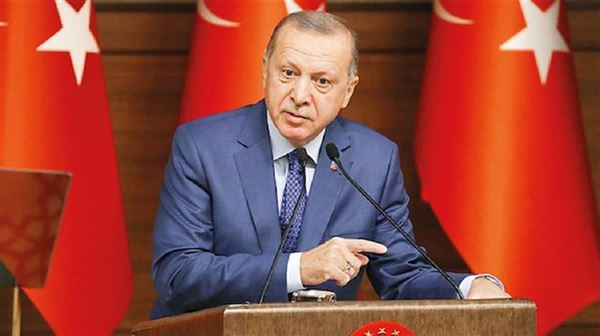YPG/PKK terrorist ringleader Ferhat Abdi Sahin, codenamed Mazloum Kobani, is wanted by Interpol and the U.S. should hand him over to Ankara, Turkey's
YPG/PKK terrorist ringleader Ferhat Abdi Sahin, codenamed Mazloum Kobani, is wanted by Interpol and the U.S. should hand him over to Ankara, Turkey’s president said Thursday.
“With the U.S., we have an extradition agreement. The U.S. should hand this man to us,” said Recep Tayyip Erdogan, adding he instructed his justice minister to take the necessary steps for Kobani’s extradition.
Speaking live on Turkey’s state-run broadcaster TRT, Erdogan said the country has been harassed by terrorists in northern Syria for eight years.
Erdogan underlined that some NATO countries armed the YPG/PKK terror group and that Germany, France and the U.S. met the leaders of the terrorist organization.
“Russia urged Turkey to enter Syria’s Ayn al-Arab [Kobani], whereas the U.S. requested the opposite,” he said.
“We will decide depending on the developments.”
He went on to say that Turkey was awaiting the end of a 150-hour pause in its anti-terror operation in northern Syria — hammered out with Russia — before joint patrols with Moscow would commence.
Critical of the U.S. administration’s failure to clear Manbij district in northwestern Syria of YPG/PKK terrorists within 90 days, he said no steps had been taken over the last year and a half.
“To whom does Manbij belong? These terrorists?” Erdogan said, adding that up to 90% of the city’s population were Arabs forced to flee amid oppression by the terror group.
He said a Turkish delegation would visit the U.S. on Nov. 13 to discuss recent developments in northern Syria, now-lifted U.S. sanctions on Turkey and bilateral ties.
Reiterating that Turkey had no issues with Kurdish people, Erdogan said: “Kurds are our brothers. We do not have problems with them. We fight only terrorists.”
Erdogan said Operation Peace Spring was named so due to the existence of large numbers of springs to the east of the Euphrates River in northern Syria.
He reiterated that the international community had been informed about Turkey’s anti-terror operation east of the Euphrates.
The Turkish leader went on to note that NATO Secretary-General Jens Stoltenberg and the international community including Germany, France, the U.K., Pakistan and Malaysia had been informed of Turkey’s counter-terrorism campaign in northern Syria.
He stressed that Turkey could still hit terrorists beyond the safe zone, underlining that the country was acting on an anti-Daesh strategy in Syria.
Asked whether Turkey would strike YPG/PKK elements in northern Syria if they did not withdraw, he responded that the Turkish military would act accordingly if diplomatic efforts did not bear any fruit.
Stressing that Turkish forces fought Daesh terrorists on the ground, Erdogan said over 3,000 members of the terrorist group had been neutralized by Turkish forces.
Erdogan said seven members of the Turkish army were martyred amid the clashes in northern Syria and 95 were wounded, while 96 were martyred from the Syrian National Army with 374 others wounded. He added that 20 civilians were martyred and 187 wounded during the operation.
Expressing his condolences to those who lost their lives and wishing a speedy recovery for the wounded, Erdogan said that solidarity between Turkey, Russia and Iran had prevented “bloodshed” in Syria’s northwestern town of Idlib.
He said the YPG/PKK terror group’s heavy weaponry should be handed over to NATO-member Turkey.
Hailing the country’s growing defense industry, Erdogan said Turkey’s nationally built armed drones provided much “relief” in the anti-terror operation.
He urged the “civilized world” to back Turkey and its operation.
“Turkey needs international support for the settling of refugees,” Erdogan said, adding Ankara planned to build hospitals and schools in a northern Syria safe zone — one of the operation’s primary aims — as well as ensure the voluntary return of refugees to the area.
He slammed the Arab League’s stance on Operation Peace Spring, adding the bloc had not helped Turkey in sheltering millions of Arabs.
“The Arab League was unable to resolve any issue in the Muslim world,” he said.
On Oct. 9, Turkey launched Operation Peace Spring to eliminate terrorists from northern Syria east of the Euphrates River in order to secure Turkey’s borders, aid in the safe return of Syrian refugees and ensure Syria’s territorial integrity.
On Oct. 22, Erdogan and his Russian counterpart Vladimir Putin held a meeting in Russia’s Black Sea resort town of Sochi.
Ankara and Moscow reached a deal under which YPG/PKK terrorists will pull back 30 kilometers (18.6 miles) south of Turkey’s border with northern Syria within 150 hours and security forces from Turkey and Russia will conduct joint patrols there.
In its more than 30-year terror campaign against Turkey, the PKK — listed as a terrorist organization by Turkey, the U.S. and the European Union — has been responsible for the deaths of 40,000 people, including women, children and infants. The YPG is the Syrian offshoot of the PKK.
Touching on inflation and investment in Turkey, Erdogan said inflation will drop significantly in the country once interest rates reach single digits, and as a result, investments in Turkey will increase.
Following a drop in interest rates, sales in the automotive sector have started to increase again, he said, adding home sales have also begun to increase, and “I believe they will increase more.”
